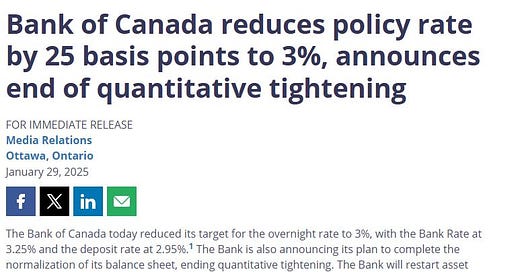I have mixed feelings regarding the Bank of Canada announcement today
I have mixed feelings regarding the Bank of Canada announcement today.
Moments ago, the Bank of Canada announced its widely anticipated sixth consecutive 0.25% rate cut, bringing the benchmark rate down to 3%. Additionally, and perhaps more significantly, they announced an early end to their balance sheet normalization process, quantitative tightening, and the resumption of asset purchases as early as March.
On one hand, this announcement aligns almost exactly with what I—and many others—have been anticipating, discussing, and writing about for over a year. These changes are highly likely to contribute to higher real estate prices in our local market, increased liquidity for sellers, higher pre-approval amounts for buyers, and more affordable mortgages for real estate holders. This type of action was central to my $472K benchmark price prediction for 2025, and I still believe that forecast will hold.
On the other hand, the BoC (at least subtly) hinted that this decision was made with the possibility of US tariffs in mind and fully expects those tariffs to push Canada into a mild recession. This comes at a time when:
The BoC benchmark rate is already more than 1% lower than the US Federal Reserve rate
The Canadian dollar is down nearly 7% against the USD over the past 12 months
The CAD has declined nearly 20% from its Spring 2021 high
I am particularly concerned about the impact of any further BoC actions on the value of our currency if the US tariff threat materializes and does indeed push us into recession. Should the BoC respond with additional stimulus—further rate cuts or another wave of quantitative easing (money printing)—this could accelerate the deterioration of the purchasing power of the CAD, with potentially serious consequences.
It’s also worth noting that the Winnipeg real estate market does not currently require stimulus. Inventory of mid-market conventional family homes remains low, while buyer demand remains strong relative to previous years. More details on this in next week’s market update.
While I fully expect this announcement to support continued price gains in real estate, my concern is that these gains may be eroded in real terms by the potential decline in our currency’s value—especially against the USD.
That said, real estate remains one of the most resilient and proven asset classes over the long term, particularly in a market like Winnipeg. As long as buyers remain mindful of their financing strategies and investors take currency/interest rate risk into account, there will still be strong opportunities in the months and years ahead.
We’ll see how this all plays out in due time, but for now, my $472K CAD benchmark forecast for 2025 remains unchanged—let’s just hope that $472K CAD today still holds the same value a year from now.
Stay safe, do your own research before making any investment decisions, and remember—I’m just some realtor on the internet. You probably shouldn’t take financial advice from me, but hey, live your life.



